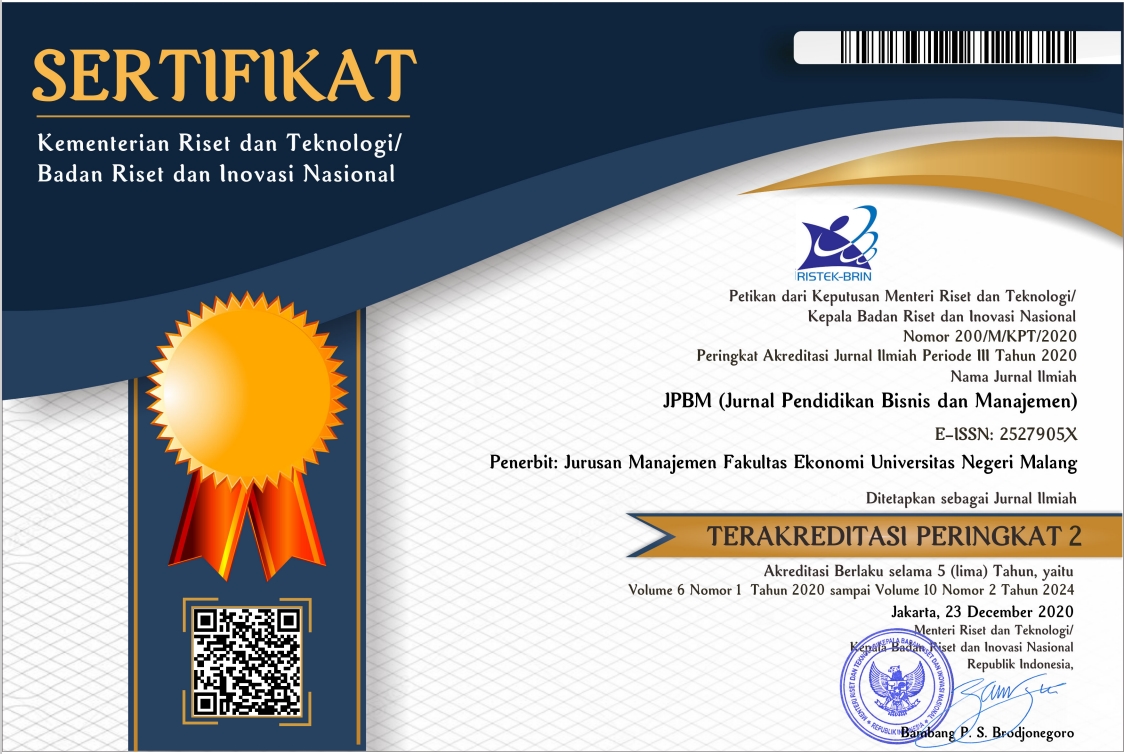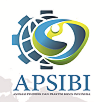Driving Factors Affecting Lecturers and Employees Performance During the Covid-19 Pandemic
Abstract
The Covid-19 pandemic has enhanced business competition at both public and private universities. As a consequence, the competition encourages universities to promote a creative strategy. To deal with this issue, this study examines the driving factors affecting lecturers and employees at PGRI University Semarang during the Covid-19 Pandemic. The sample was selected using simple random sampling with a total of 206 respondents consisting of 81 employees and 125 lecturers. The measurement of the study adopted a Likert scale, and the data obtained were processed using Partial Least Square (PLS). The results of the study indicate that there is a direct influence of employee management on organizational culture. Additionally, this study remarks that a robust correlation between organizational learning and organizational culture as well as organizational culture can promote the performance of lecturers and employees. Lastly, there is no direct influence of employee arrangement on the performance of lecturers and employees. The largest total effect on the performance of lecturers and employees is organizational learning, which includes a direct effect of 39.3 percent and an indirect effect through the organizational culture of 21.9 percent.
Keywords: Staffing Practices, Organizational Learning, organizational culture, employee performance
Keywords
Full Text:
PDFReferences
Abdullah, Z., Ahsan, N., & Alam, S. S. (2009). The effect of human resource management practices on business performance among private companies in Malaysia. International Journal of Business and management, 4(6), 65-72.
Aswati, S., Mulyani, N., Siagian, Y., & Syah, A. Z. (2015). Peranan sistem informasi dalam perguruan tinggi. Jurteksi Royal, 1(2), 79-86.
Badubi, R. M. (2017). Theories of motivation and their application in organizations: A risk analysis. International Journal of Innovation and Economic Development, 3(3), 44-51.
Bagapova, G., Kobilova, N., & Yuldasheva, N. (2020). The role of distance education and computer technologies in teaching foreign languages. European Journal of Research and Reflection in Educational Sciences, 8(10), 206-211.
Barao, A., de Vasconcelos, J. B., Rocha, Á., & Pereira, R. (2017). A knowledge management approach to capture organizational learning networks. International Journal of Information Management, 37(6), 735-740.
Correa, J. A., Gracia-Morales, V. J., and Cardon-Pozo, E . (2007). Leadership and organizational learnings role on innovation and performance: Lesson from Spain. Journal of Industrial Marketing Management, 36, 349-359
Ellinger, A.D., Ellinger, A.E. and Keller, S.B. (2003) Supervisory coaching behavior, employee satisfaction, and warehouse employee performance: A dyadic perspective in the distribution industry. Human Resource Development Quarterly, 14, 435-458.
Ghiasi, A., Davlyatov, G. K., Lord, J. C., & Weech-Maldonado, R. (2019). Organizational and community factors associated with nursing home organizational culture. Innovation in Aging, 3(Suppl 1), S510.
Grossi, G., Dobija, D., & Strzelczyk, W. (2020). The impact of competing institutional pressures and logics on the use of performance measurement in hybrid universities. Public Performance & Management Review, 43(4), 818-844.
Hair Jr, J. F., Sarstedt, M., Hopkins, L., & Kuppelwieser, V. G. (2014). Partial least squares structural equation modeling (PLS-SEM): An emerging tool in business research. European Business Review, 26(2), 106-121
Handayati, P., Wibowo, A., Narmaditya, B. S., Kusumojanto, D. D., Setiawan, A. B., & Tung, D. T. (2021). The university students’ enterprises development: Lesson from Indonesia. Cogent Education, 8(1), 1973286.
Hofstede, G., & Bond, M. (1988). The confucius connection from cultural roots to economic growth. Organizational Dynamics, 16, 4-21.
Lopez, S. P., Peon, J. M. M., & Ordas, C. J. V. (2005). Organizational learning as a determining factor in business performance. The Learning Organization, 12, 227-245.
Lukito, S.K., dan Elsye, S., (2014). pengaruh organizational culture terhadap firm performance melalui learning organization pada sektor non manufaktur di Surabaya. Jurnal Business Accounting, 2(2), 111-122.
Montes, J. L., Moreno, A. R., & Morales, V. G. (2005). Influence of support leadership and teamwork cohesion on organizational learning, innovation and performance: an empirical examination. Technovation, 25(10), 1159-1172.
Nugroho, M. A. (2018). The effects of collaborative cultures and knowledge sharing on organizational learning. Journal of Organizational Change Management, 31 (5), 1138-1152
Odero, J. A., & Makori, M. E. (2018). Employee involvement and employee performance: The case of part time lecturers in public universities in Kenya. International Journal of Management and Commerce Innovations, 5(2), 1169-1178.
Osabiya, B. J. (2015). The effect of employees motivation on organizational performance. Journal of public administration and policy research, 7(4), 62-75.
Osemeke, M. (2012). The impact of human resource management practices on organizational performance: A study of Guinness Nigeria Plc. International Journal of Arts and Humanities, 1(1), 79-94.
Pudjiarti, E., & Darmanto, S. (2020). Interactive control capability, effective organizational learning and firm performance: An empirical study of milling and metal industry in Tegal. Management Science Letters, 10(3), 575-584.
Raina, R., & Roebuck, D. B. (2016). Exploring cultural influence on managerial communication in relationship to job satisfaction, organizational commitment, and the employees’ propensity to leave in the insurance sector of India. International Journal of Business Communication, 53(1), 97-130.
Ruhullah, M. E., & Purwaningsih, T. (2021). Political leadership transmission practices by the political parties from 2006: A study of democracy in Bangladesh. Jurnal Ilmiah Muqoddimah: Jurnal Ilmu Sosial, Politik dan Hummaniora, 5(2), 308-319.
Saeed, B. B., Afsar, B., Hafeez, S., Khan, I., Tahir, M., & Afridi, M. A. (2019). Promoting employee’s pro environmental behavior through green human resource management practices. Corporate Social Responsibility and Environmental Management, 26(2), 424-438.
Saptono, A., Wibowo, A., Narmaditya, B. S., Karyaningsih, R. P. D., & Yanto, H. (2020). Does entrepreneurial education matter for Indonesian students’ entrepreneurial preparation: The mediating role of entrepreneurial mindset and knowledge. Cogent Education, 7(1), 1836728.
Siron, Y., Wibowo, A., & Narmaditya, B. S. (2020). Factors affecting the adoption of e-learning in Indonesia: Lesson from Covid-19. JOTSE: Journal of Technology and Science Education, 10(2), 282-295.
Soomro, B. A., & Shah, N. (2019). Determining the impact of entrepreneurial orientation and organizational culture on job satisfaction, organizational commitment, and employee’s performance. South Asian Journal of Business Studies, 8(3), 266-282.
Sutanto, E. M. (2017). The influence of organizational learning capability and organizational creativity on organizational innovation of Universities in East Java, Indonesia. Asia Pacific Management Review, 22(3), 128-135.
Takeuchi, R., Lepak, D.P., Wang, H. and Takeuchi, K. (2007) An empirical examination of the mechanisms mediating between high-performance work systems and the performance of Japanese Organizations. Journal of Applied Psychology, 92, 1069-1083.
Tzafrir, S. S. (2006). A universal perspective for explaining the relationship between hrm practices and firm performance at different point in time. Journal of Managerial Psychology, 21(2), 109-130
Van Esch, P., Black, J. S., & Ferolie, J. (2019). Marketing AI recruitment: The next phase in job application and selection. Computers in Human Behavior, 90, 215-222.
Zhao, Y. (2018). Managing Chinese millennial employees and their impact on human resource management transformation: an empirical study. Asia Pacific Business Review, 24(4), 472-489.
Refbacks
- There are currently no refbacks.
JPBM (Jurnal Pendidikan dan Bisnis Manajemen) is licensed under a Creative Commons Attribution-NonCommercial-ShareAlike 4.0 International License.
JPBM (Jurnal Pendidikan dan Bisnis Manajemen) is abstracted and indexed in :
















